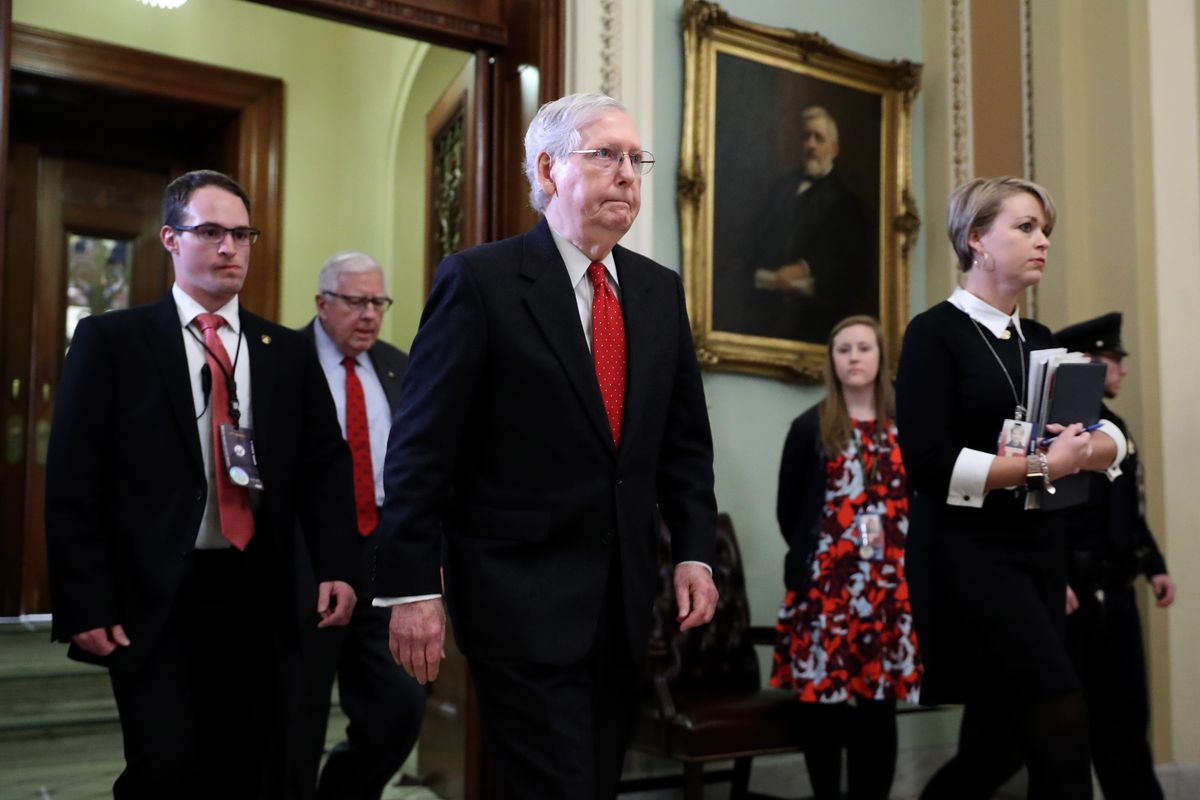Senate sets rules for President Trump’s impeachment trial; Republicans block all 11 Democratic amendments

A few minutes every morning is all you need.
Stay up to date on the world's Headlines and Human Stories. It's fun, it's factual, it's fluff-free.
The United States Senate began the impeachment trial of President Donald Trump on Tuesday with a 13-hour session that set rules for the trial. The Republican-led Senate blocked much of the Democrats’ agenda for the trial, including allowing additional evidence and testimony.
The highly partisan atmosphere around the trial has left many to assume Trump’s acquittal is unlikely. However, each side will have three days to present their case that the president abused his power and obstructed justice.
McConnell’s original rules for the trial
With Chief Justice John Roberts presiding over the Senate trial, Tuesday was devoted entirely to setting the rules for the trial. Prior to Tuesday’s proceedings, Majority Leader Mitch McConnell, a member of Trump’s Republican Party, released his rules for the trial. The rules were designed to expedite the trial process.
In McConnell’s original rules, both the Democratic prosecution and Republican defense would be given two days to provide their case. Each side is afforded 24 hours to present their opening arguments, so a two-day window would require two 12-hour days, with the arguments lasting past midnight each day. This is a change from the three days allowed in the Clinton impeachment trial.
Senate Minority Leader Chuck Schumer, a Democrat, said McConnell’s purpose for this shortened timespan was “making it much more difficult to get witnesses and documents and … rushing the trial through.” It would have the result, Schumer said, of hiding “evidence from the American people.”
Democrats had previously pushed back against McConnell’s stated desire to prevent witness testimony at the trial. They have also voiced concern over McConnell’s promise to coordinate with White House counsel for the trial and his December 2019 public statement that he was not an impartial juror.
Thursday, Senators swore an oath to provide “impartial justice.”
[article_ad]
The Democrats’ 11 failed amendments
Early in the Tuesday proceedings, Democrats won a concession from McConnell to extend the opening hearing to three days. According to The Hill, Some Republicans, including Sen. Susan Collins, pushed back on the two-day limit, which is why McConnell allowed the change. Another concession was the admittance of the House impeachment record into the trial record.
Those would prove to be the Democrats’ only victories for the day. The Democrats proposed 11 amendments to McConnell’s rules, most of them focused on allowing additional witnesses and evidence that hadn’t been presented during the original House inquiry. All but one of the amendments were voted down along party lines, 53-47.
Collins was the one Republican defector on the 10th proposed amendment, which would have provided extra time for each side to respond to motions from the other side. Despite Collins’ support, the amendment failed.
The rules are now set
A little after 2 am on Wednesday morning, the final rules for the trial were voted on and set. Each side will have three days to present a 24-hour opening argument. The prosecution’s presentation was set to start on Wednesday at 1 p.m. and continue through Thursday and Friday. That will be followed by a rebuttal by the President’s defense team.
Senators will be given 16 hours to write questions for each team, which will be read by Roberts. With additional witnesses and evidence rejected on Tuesday, that will allow a vote on the two articles of impeachment to follow shortly after. That could mean that the trial is over by the end of next week, prior to Trump’s February 4 State of the Union address, as the president had hoped.
For the president to be removed from office, two-thirds of the senators – 67 of the 100 – would have to vote for at least one of the articles of impeachment. That is unlikely to happen.
[article_ad]
What will be missing from the trial
The House inquiry included the testimony of many important figures in the scandal surrounding Trump’s alleged effort to force the Ukrainian government to open an investigation into former Vice President Joe Biden, a potential rival in the 2020 election. However, the White House blocked many firsthand witnesses from testifying.
One crucial figure in the scandal is former White House national security advisor John Bolton. After not having testified in the original House impeachment inquiry, Bolton said in early January that he would testify in the Senate trial if subpoenaed. That will not happen now Republicans have blocked that the Democrats’ efforts to include subpoenas and additional testimony.
Additionally, on January 21, while the Senate was debating the trial rules, American Oversight, a nonpartisan watchdog organization, obtained a trove of documents related to Trump freezing military aid to Ukraine. The 192 pages were released by the Office of Management and Budget. The documents are said to include emails between key figures in the scandal.
However, the Senate voted not to include additional evidence, so these new details won’t be part of the record in the trial.
[article_ad]




Comments ()